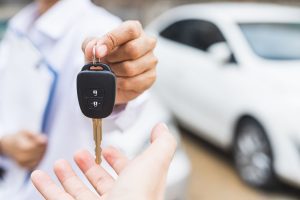One of the more unique elements of Florida injury law is the dangerous instrumentality doctrine. It essentially allows the owner of a vehicle to be held legally responsible for damages inflicted by negligent operation of that vehicle, even if it wasn’t the owner who was driving. As a Broward injury lawyer can explain, it’s an important path to compensation when a negligent driver is young, poorly insured, and/or lacking in personal assets. 
Recently, the Florida Supreme Court was asked to weigh in on whether a claimant could pursue claims of dangerous instrumentality against two parties – both parents of the driver, one the title holder and the other the “bailee.” The “bailee” is one who gains possession/control of property but does not actually own it. Here, the father of the negligent, 21-year-old driver was the title-holder. The mother was the bailee; she was the primary driver of the car, but both parents frequently permitted their son to drive it as well.
According to court records in Emerson v. Lambert et al., the young man was driving home from dinner when he struck a motorcyclist, who is the plaintiff in this case. The crash was catastrophic, leaving the motorcyclist a quadriplegic.
In the subsequent Florida injury lawsuit, plaintiff named the driver and his parents as defendants, the latter two allegedly vicariously liable under the dangerous instrumentality doctrine.
Jurors would later hear testimony that while the mother was the primary driver of the car, it was considered a “family car,” and anyone of driving age was free to take the extra key and use the car as needed. On the day of the crash, the young driver said he understood he had both his parents’ general permission to use the car. He was unsure if he’d spoken to his father that day, but he did expressly ask his mother for permission to take the car before leaving. She granted it.
As the trial wound to a close, the mother sought a directed verdict, arguing she couldn’t be liable under the dangerous instrumentality doctrine because the doctrine didn’t support holding family members liable as bailees. The trial court denied this motion, citing the 2000 Florida Supreme Court decision in Aurbach v. Gallina, a prior state supreme court ruling that left open the chance that a family member with identifiable property interest in a vehicle could be held vicariously liable, even if they didn’t personally own the vehicle.
The question of the mother’s liability as the bailee of the vehicle was put to the jury. The instruction was that if the greater weight of the evidence showed that she, as the vehicle bailee, gave her express or implied consent for her son to drive the car, then she should be held liable for his negligence.
The jury decided that as far as the crash itself, the driver was 75 percent liable and the motorcyclist 25 percent liable. It also found that the driver’s father as the car title owner and mother as bailee could be held vicariously liable for his negligence. Total damages were set at $27.4 million. After weighing fault apportionment and medical/social security disability setoffs, that meant a net judgment in favor of the plaintiff at $18.9 million. That amount was reduced to the statutory maximum of $600,000, pursuant to 324.021(9)(b)3, which limits financial damages owed due to a vehicle owner’s vicarious liability.
The mother again sought a directed verdict, as well as a new trial. Both requests were denied, and the case went to the Florida 2nd District Court of Appeal. The appellate court denied the request for a new trial, but reversed the trial court’s ruling on the issue of the mother’s vicarious liability. The court ruled that if a title owner of a car entrusts that vehicle to a family member who in turn inflicts injury on others with the car, the title owner can be vicariously liable. If a non-title-holding family member has a property interest in a car (as a bailee or otherwise) and then entrusts that car to another who causes injury, the bailee can only be liable if the title owner denies liability for that entrustment. That wasn’t the case here, the 2nd DCA ruled. The father/title owner should be vicariously liable for the entrustment.
The case was remanded to the trial court, but the 2nd DCA certified the question to the Florida Supreme Court, which in a split-ruling determined the appellate court ruled correctly. Vicarious liability under dangerous instrumentality doctrine would extend her to the father as the title owner, but not also the mother as the bailee.
Florida is the only state at this point that recognizes the dangerous instrumentality when it comes to vehicle owner liability for driver negligence. But as this case shows, its application isn’t unlimited.
If you’re injured in a Fort Lauderdale car accident, a Broward injury lawyer can explore every possible avenue and fight for maximum compensation.
Call Fort Lauderdale Injury Attorney Richard Ansara at (954) 761-4011. Serving Broward, Miami-Dade and Palm Beach counties.
Additional Resources:
Emerson v. Lambert et al., Nov. 16, 2023, Florida Supreme Court
More Blog Entries:
4 Ways Broward Truck Accidents Differ From Other Types of Crash Claims, Sept. 7, 2023, Broward Injury Lawyer Blog
 Broward Injury Lawyer Blog
Broward Injury Lawyer Blog



